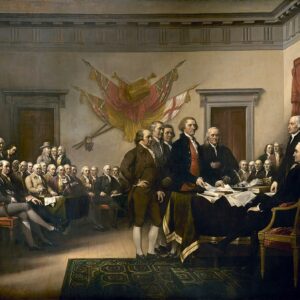In America’s vocabulary the phrase “Fourth of July” is synonymous with “star-spangled party.” It’s been that way from the very beginning.
Founding Father John Adams (who put his name on the Declaration of Independence that sweltering day 248 summers ago) recognized it for the sea change in world history it would eventually prove to be. He famously wrote to his wife, “I am apt to believe that it will be celebrated, by succeeding Generations, as the great anniversary Festival. It ought to be commemorated, as the Day of Deliverance by solemn Acts of Devotion to God Almighty. It ought to be solemnized with Pomp and Parade, with Shews, Games, Sports, Guns, Bells, Bonfires and Illuminations from one End of this Continent to the other from this Time forward forever more.”
(Though Adams did get one thing wrong. He advocated celebrating on July 2, the day the Second Continental Congress voted to break away from England. However, the actual document carries the date July 4, when it was unanimously approved and sent to King George III. And it’s been July 4 ever since.)
It truly is a tale of triumph, a David and Goliath moment when a band of scrappy rebels stood up to a world superpower and, in defiance of all odds, won. July 4, 1776, is indeed worthy of celebrating.
But did you know that almost exactly one year to the day earlier, that very same band of rebels had tried to kiss and make up with the Crown? This is the far less well-known story of the Olive Branch Petition.
Any schoolchild (or at least those who were students when schools still taught history) can tell you about the Revolutionary War’s beginnings. The Stamp Act. The Boston Tea Party. No taxation without representation. Paul Revere’s Ride. Lexington and Concord. Bunker Hill.
The first year of the conflict, which erupted in April 1775, was a wild ride. The 13 colonies banded together to fight the Mother Country, slapped together a Continental Congress, and raised an army.
But it’s important to remember that not all colonists were on the Patriot side. In a very real sense, the conflict they fought was as much a civil war as it was a revolution. Roughly one-third of the population were Patriots; another third were Tories, who stuck with England; and the final third kept their heads down and hoped the whole thing would blow over.
There were divisions within the Continental Congress, too. Some delegates strongly advocated for an immediate break from Britain. Others took a more measured, “let’s wait and see” approach.
For their part, the Brits felt the colonists were ungrateful children who had been so spoiled they didn’t appreciate the Crown’s largesse. So, George III felt it was time for a “tough love” reminder of who the boss really was.
After 90 days of warfare, the future of the fledgling Patriot cause was murky, to say the least. There was a faction that believed, in the words John Lennon would use nearly 200 years later, “All we are saying is give peace a chance.”
And so the Continental Congress did just that. Prior to adjourning, it passed the Olive Branch Petition.
Flowery 18th Century prose aside, the document contained a generous amount of royal fanny kissing. Lots of “your most gracious Majesty” flattery and a reminder that the petitioners were “your Majesty’s faithful subjects.”
When all the niceties were peeled away, the petition came down to this: “We’ve made our point with bullets. Just cut us a better deal on taxes and trade regulations, and everything will be hunky-dory again. Promise!”
It went on to add, “The union between our Mother country and these colonies” was “the wonder and envy of other Nations.” (Translation: “Independence? Who said anything about independence? Wink-wink.”)
The document was adopted, and dutifully hustled off to London aboard the fastest available ship.
George III responded in August with the official Proclamation of Rebellion, essentially a declaration of war. It was game on from that time forward.
And while it’s good to remember how the Founding Fathers laid it on the line when they declared independence on July 4, 1776, let us pause between wolfing down hotdogs and lighting firecrackers to give thanks that what they did on July 5, 1775, was blown off by the Brits.
If they hadn’t, we’d be having tea and crumpets and would have to go to work on Thursday.

